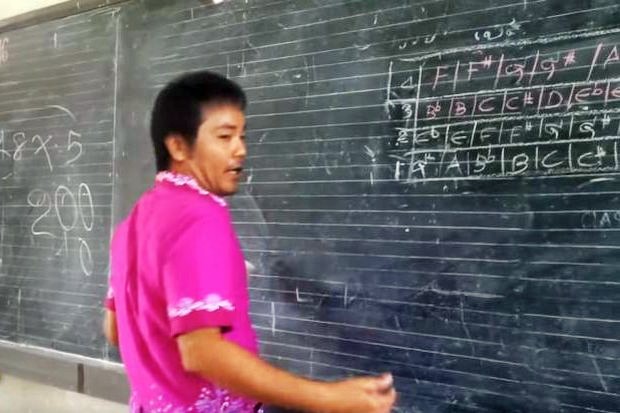
About 20,000 maths and science teachers of students in Matthayom 1-3 (Grades 7-9) nationwide will be required to take online aptitude exams in April next year to test their proficiency in these subjects.
The move is part of the Education Ministry's effort to improve the quality of teachers in STEM-related subjects (Science, Technology, Engineering and Maths) as it believes some teachers in these fields may not know enough about their subjects to educate their students properly.
The exam will be organised by the Office of the Basic Education Commission (Obec).
Internationally, Thai students' performance in these subjects is poorer than in other Asian countries, according to the latest Organisation for Economic Co-operation and Development's (OECD) Programme for International Assessment results based on the performance of 15-year-olds in maths and science tests.
In the 76-nation ranking, Thailand was placed 47th, far lower than other Asian countries. Singapore emerged as best in the world followed by Hong Kong, South Korea, Japan and Taiwan, while Vietnam also did well placing 12th in the league table.
Domestically, the results of the 2015 Ordinary National Education Test (O-Net), which measures students' basic knowledge in five key subjects also showed that Mathematics and Science were Thai students' least favourite subjects with average scores of 26.59 and 33.4 respectively out of a maximum score of 100.
Obec's deputy secretary-general, Boonrak Yodpetch, said the poor performance of the students can often be traced back to the skills of their teachers. "A lack of quality teachers could probably be the answer to why providing more resources to schools has been so ineffective in improving student performance," said Mr Boonrak.
Hence, Obec is now in the process of setting up online exams to test the proficiency of teachers' in maths and science beginning in April 2017.
"Teachers who fail to pass the test will have to attend special courses, organised by Obec, to improve their knowledge over four months from May to September. Then, they will be tested again," Mr Boonrak said.
If they fail again, they will be switched to teach in other subjects which suit their teaching specialties, he added.
On the other hand, for teachers who pass the test, their scores and performance will be taken into account in their annual Key Performance Indicator (KPI) evaluation.
Obec's deputy secretary-general said the first phase of the evaluation will only cover about 20,000 maths and science teachers of students in Matthayom 1-3 in schools nationwide and the test will be applied for teachers in other grade levels in the next stage.
Mr Boonrak said while the country is now facing a huge shortage of teachers in STEM-related subjects, as many experienced teachers enter retirement, Obec still favours quality over quantity.
"To improve our students' performance, we need to focus on the quality of teachers over quantity because teacher quality is a key determinant of student learning," he said.
An experienced maths teacher at a school in Bangkok, who asked not to be named, said she agreed with Obec's idea because she thought many teachers nowadays do not have a conceptual understanding of mathematics.
She said the common core standards in mathematics stress the importance of conceptual understanding as a key component of mathematical expertise, but many teachers just think that if students know all the definitions and rules, then they possess such an understanding.
"Knowledge of procedures is no guarantee of conceptual understanding; for example, many children can execute a procedure to divide fractions without understanding why the procedure works, so we need teachers who can educate the students properly," she said.
To deal with the shortage of teachers in STEM subjects, the Education Ministry recently announced a plan to open the door to graduates in subjects other than education to teach in state schools to help solve the shortage of STEM teachers.
This means people who do not have degrees in teaching or education, but hold degrees in STEM-related areas such as engineering and computer science, would be allowed to temporarily teach in schools for two years.
In that two-year period, those temporary teachers can join training programmes to meet the requirements needed to acquire a permanent teaching licence.
The ministry acted in March of this year in response to requests from principals nationwide who were concerned as they were having a hard time recruiting teachers in STEM fields. The ministry discussed the matter with the Office of the Teacher Civil Service and Educational Personnel Commission (OTEPC), and the Teachers Council of Thailand.
Meanwhile, university students in maths and science with strong academic records will also be offered several scholarships to become teachers after graduating.


